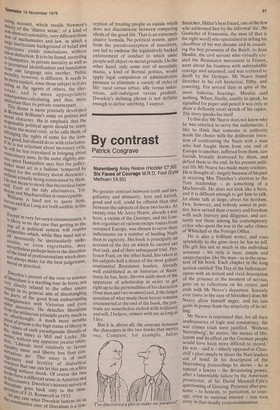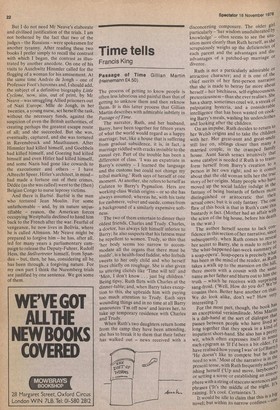By contrast
Patrick Cosgrave
Nuremberg Airey Neave (Hodder E7.50) Six Faces of Courage M.R.D. Foot (Eyre Methuen E4.95) No greater contrast between truth and lies, gallantry and immanity, love and hatred, good and evil, could be offered than that between the subjects of these two books. At twenty-nine Mr Airey Neave, already a war hero, a victim of the Gestapo, and the London organiser of various escape routes from occupied Europe, was chosen to serve their indictments on a number of leading Nazis then in captivity. His book is principally an account of the day on which he carried out that task, and of their subsequent trial. Professor Foot, on the other hand, has taken as his subjects half a dozen of the most gallant continental Resistance leaders. Already well established as an historian of Resistance he has, here, thrown aside most of the apparatus of scholarship in order to get right up to the personalities of his characters (four men and two women) and, if the larger question of what made them heroic remains unanswered at the end of the book, the portraits are nonetheless etched with brilliance and will, I believe, remain with me as long as I live.
But it is, above all, the contrast between the characters in the two books that moves one. Compare, for example, Julius Streicher, Hitler's best friend, one of the few who addressed him by the informal 'du', the Gauleiter of Franconia, the man (if that is the right word) who specialised in telling his chauffeur of his wet dreams and in assaulting the boy prisoners of the Reich, to Jean Moulin, the civil servant who virtually created the Resistance movement in France, went about his business with unbreakable courage and unarmed, and was tortured to death by the Gestapo. Mr Neave found Streicher in his cell hysterical, filthy, and cowering. For several days in spite of the most hideous beatings, Moulin said nothing. When, finally, unable to speak, he signalled for paper and pencil it was only to draw a defiantly cruel sketch of his captor. The story speaks for itself. To this day Mr Neave does not know why he was selected to serve the indictments. I like to think that someone in authority made the choice with the deliberate intention of confronting the Nazis with a man who had fought them from one end of Europe to another, suffered from them, saw friends brutally destroyed by them, and defied them to the end. In his present political life Mr Neave has made many enemies. He is thought of —largely because of his part in securing Mrs Thatcher's election to the Tory leadership — as something of a Machiavelli. He does not look like a hero, and it is difficult enough to get him to talk, let alone talk at large, about his heroism. Few, however, and nobody senior in politics, have served their country and freedom with such bravery and diligence, and certainly not those among his contemporary critics who spent the war in the safer climes of Whitehall or the Foreign Office.
He is also a brilliant writer, and rises splendidly to the grim story he has to tell. His gift lies not so much in the individual sentence — his style is bare, simple and unspectacular, like the man as in the structure of his book. Each chapter in the long section entitled 'The Day of the Indictment' opens with an instant and vivid description of the prisoner at the moment of service, goes on to reflections on his career, and ends with Mr Neave's departure. Scarcely ever (save in the case of Streicher) does Mr Neave allow himself anger, and his tale gains in power from the simplicity of its telling.
Mr Neave is convinced that, for all their inadequacies of logic and consistency, the war crimes trials were justified. 'Without Nuremberg', he writes, 'the nature of Hitlerism and its effect on the German people would have been more difficult to record.' He was — and is — utterly opposed to Churchill's plan simply to shoot the Nazi leaders out of hand. In his description of the Nuremberg proceedings he shows — he is himself a lawyer — the devastating power, after a lamentable failure by the American prosecutor, of Sir David Maxwell-Fyfe's questioning of Goering. Pretence after pretence — to honesty, to patriotism, to courage, even to national interest — was torn away in that deadly cross-examination. But I do not need Mr Neave's elaborate and civilised justification of the trials. I am not bothered by the fact that two of the judges — the Russians — were spokesmen for another tyranny. After reading these two books I prefer simply to recall the contrast with which I began, the contrast as illustrated by another anecdote. On one of his visits to Auschwitz Himmler called for the flogging of a woman for his amusement. At the same time Andree de Jongh — one of Professor Foot's heroines and, I should add, the subject of a definitive biography Little Cyclone, now, alas, out of print, by Mr Neave — was smuggling Allied prisoners out of Nazi Europe. Mlle de Jongh, in her twenties, a young nurse, set herself the task, without the necessary funds, against the suspicion of even the British authorities, of creating perhaps the greatest escape route of all; and she succeeded. But she was, eventually, captured, and she was tortured in Ravensbruck and Mauthausen. After Himmler had killed himself, and Goebbels had killed himself, and Goering had killed himself and even Hitler had killed himself, and some Nazis had gone like cowards to the executioner and others — I have Albrecht Speer, Hitler's architect, in mind — had made a fortune out of their crimes, Dedee (as she was called) went to the (then) Belgian Congo to nurse leprosy victims.
And there is Barbie. Barbie is the man who tortured Jean Moulin. For some unfathomable — and, by its nature unjustifiable — reason, the American forces occupying Westphalia declined to hand him back to the French after the war. Fearful of vengeance, he now lives in Bolivia, where he is called Altmann. Mr Neave might be prepared to forgive him — he has, after all, led for many years a parliamentary campaign to release the Deputy-Fuhrer, Rudolf Hess, the Stellvertreter himself, from Spandau — but, then, he has, considering all he has been through, a forgiving nature. For my own part I think the Nuremberg trials are justified by one sentence. We got some of them.



































 Previous page
Previous page